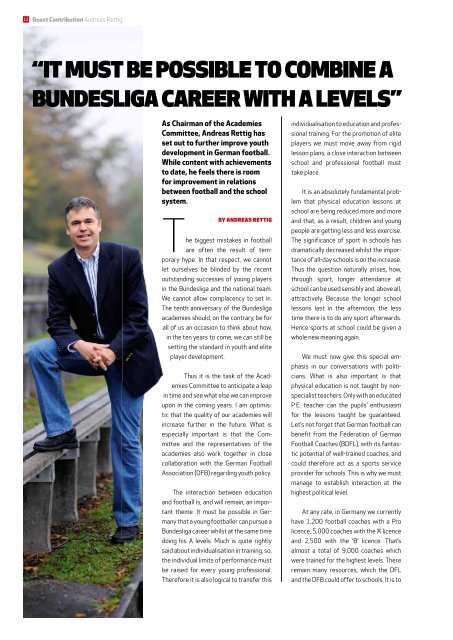10 Years Of German Academy Training.pdf
- No tags were found...
You also want an ePaper? Increase the reach of your titles
YUMPU automatically turns print PDFs into web optimized ePapers that Google loves.
12<br />
Guest Contribution Andreas Rettig<br />
“It must be possible to combine a<br />
Bundesliga career with A levels”<br />
As Chairman of the Academies<br />
Committee, Andreas Rettig has<br />
set out to further improve youth<br />
development in <strong>German</strong> football.<br />
While content with achievements<br />
to date, he feels there is room<br />
for improvement in relations<br />
between football and the school<br />
system.<br />
By Andreas Rettig<br />
The biggest mistakes in football<br />
are often the result of temporary<br />
hype. In that respect, we cannot<br />
let ourselves be blinded by the recent<br />
outstanding successes of young players<br />
in the Bundesliga and the national team.<br />
We cannot allow complacency to set in.<br />
The tenth anniversary of the Bundesliga<br />
academies should, on the contrary, be for<br />
all of us an occasion to think about how,<br />
in the ten years to come, we can still be<br />
setting the standard in youth and elite<br />
player development.<br />
Thus it is the task of the Academies<br />
Committee to anticipate a leap<br />
in time and see what else we can improve<br />
upon in the coming years. I am optimistic<br />
that the quality of our academies will<br />
increase further in the future. What is<br />
especially important is that the Committee<br />
and the representatives of the<br />
academies also work together in close<br />
collaboration with the <strong>German</strong> Football<br />
Association (DFB) regarding youth policy.<br />
The interaction between education<br />
and football is, and will remain, an important<br />
theme. It must be possible in <strong>German</strong>y<br />
that a young footballer can pursue a<br />
Bundesliga career whilst at the same time<br />
doing his A levels. Much is quite rightly<br />
said about individualisation in training, so,<br />
the individual limits of performance must<br />
be raised for every young professional.<br />
Therefore it is also logical to transfer this<br />
individualisation to education and professional<br />
training. For the promotion of elite<br />
players we must move away from rigid<br />
lesson plans; a close interaction between<br />
school and professional football must<br />
take place.<br />
It is an absolutely fundamental problem<br />
that physical education lessons at<br />
school are being reduced more and more<br />
and that, as a result, children and young<br />
people are getting less and less exercise.<br />
The significance of sport in schools has<br />
dramatically decreased whilst the importance<br />
of all-day schools is on the increase.<br />
Thus the question naturally arises, how,<br />
through sport, longer attendance at<br />
school can be used sensibly and, above all,<br />
attractively. Because the longer school<br />
lessons last in the afternoon, the less<br />
time there is to do any sport afterwards.<br />
Hence sports at school could be given a<br />
whole new meaning again.<br />
We must now give this special emphasis<br />
in our conversations with politicians.<br />
What is also important is that<br />
physical education is not taught by nonspecialist<br />
teachers. Only with an edu cated<br />
P. E. teacher can the pupils’ enthu siasm<br />
for the lessons taught be guaranteed.<br />
Let’s not forget that <strong>German</strong> football can<br />
benefit from the Federation of <strong>German</strong><br />
Football Coaches (BDFL), with its fantastic<br />
potential of well-trained coaches, and<br />
could therefore act as a sports service<br />
provider for schools. This is why we must<br />
manage to establish interaction at the<br />
highest political level.<br />
At any rate, in <strong>German</strong>y we currently<br />
have 1,200 football coaches with a Pro<br />
licence, 5,000 coaches with the ‘A’ licence<br />
and 2,500 with the ‘B’ licence. That’s<br />
almost a total of 9,000 coaches which<br />
were trained for the highest levels. There<br />
remain many resources, which the DFL<br />
and the DFB could offer to schools. It is to




